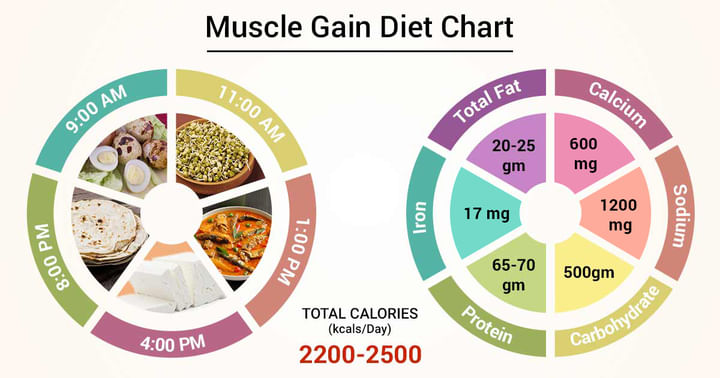Diet Chart For Muscle Gain
Last Updated: Dec 09, 2022
About
Muscle is a soft tissue found in most animals. Muscle cells contain protein filaments of actin and myosin that slide past one another, producing a contraction that changes both the length and the shape of the cell. To gain your muscles you have to follow a healthy or best diet plandiet.
Generally speaking, bodybuilders require more calories than the average person of the same weight to provide the protein and energy requirements needed to support their training and increase muscle mass. A sub-maintenance level of food energy is combined with cardiovascular exercise to lose body fat in preparation for a contest.
The ratios of calories from carbohydrates, proteins, and fats vary depending on the goals of the bodybuilder. Carbohydrates play an important role for bodybuilders. They give the body energy to deal with the rigors of training and recovery.
Proteins are the building block of muscles, so it is essential to consume an adequate amount of protein. Animal protein has high biological value than plant protein, so protein from animal sources is preferred over protein from plant sources. Apart from these include all different fruits and vegetables to get vitamins and minerals.
To build a bigger and leaner physique, bodybuilders and average guys alike often turn to the same strategy: eating everything in sight, or “bulking,” and then burning fat, or “cutting,” by reducing calories and eating cleaner to reveal the new muscle beneath. It works, but it takes time and can cause you long-term damage on a cellular level—and it can make it very hard to stay lean over the long term.
Diet Chart
| Sunday | |
| Breakfast (8:00-8:30AM) | chapati-4 + Egg roast 1/2 cup 2 egg |
| Mid-Meal (11:00-11:30AM) | green gram sprouts 1 cup |
| Lunch (2:00-2:30PM) | 4 Roti +1/2 cup salad + Fish curry (180 gm fish) + 1/2 cup cabbage subji. |
| Evening (4:00-4:30PM) | 1 Portion fruit+ cottage cheese |
| Dinner (8:00-8:30PM) | 3 Roti/Chapati + Tomato subji 1/2 cup. |
| Monday | |
| Breakfast (8:00-8:30AM) | Chicken sandwich (4 slice bread) + 1 cup skimmed milk. |
| Mid-Meal (11:00-11:30AM) | 1 Portion fruit salad + Cottage cheese. |
| Lunch (2:00-2:30PM) | Veg pulav rice 1.5 cup + 1 cup Soya Chunk curry + 1/2 cup Low fat curd. |
| Evening (4:00-4:30PM) | 1 cup light tea + Chicken salad 1 cup. |
| Dinner (8:00-8:30PM) | 3 roti/ Chapathi + Lady finger subji 1/2 cup. |
| Tuesday | |
| Breakfast (8:00-8:30AM) | Sprouts & Paneer Paratha 3 + Green chutney. |
| Mid-Meal (11:00-11:30AM) | 1 cup boilled black channa. |
| Lunch (2:00-2:30PM) | 1.5 cup rice + chicken curry (150 gm chicken) + Palak subji 1/2 cup + 1/2 cup low fat curd. |
| Evening (4:00-4:30PM) | 1 Portion fruit salad + Yoghurt |
| Dinner (8:00-8:30PM) | Brocken wheat upma 1 cup + 1/2 cup green beans subji |
| Wednesday | |
| Breakfast (8:00-8:30AM) | Soya flour Uttapam 2 +Tomato /green chutney + 1 glass skimmed milk. |
| Mid-Meal (11:00-11:30AM) | 1 Portion fruit salad + Cottage cheese. |
| Lunch (2:00-2:30PM) | 1.5 cup rice+Kidney beans curry 1 cup + 1/2 cup cucumber salad + Lady finger subji 1/2 cup. |
| Evening (4:00-4:30PM) | 1 Cup light tea + Brown rice flakes poha with nuts 1 cup. |
| Dinner (8:00-8:30PM) | Wheat dosa 3 + 1 cup Bitter guard subji. |
| Thursday | |
| Breakfast (8:00-8:30AM) | Mushroom Paratha 2 + Tomato chutney + Scrambled egg (2 eggs) |
| Mid-Meal (11:00-11:30AM) | plane Yoghurt with raw vegetables / grilled vegetables - 1 cup |
| Lunch (2:00-2:30PM) | 1/2 cup rice + 3 medium chapati + Fish masala 1 cup (fish 180 g) + Snake guard subji 1/2 cup. |
| Evening (4:00-4:30PM) | 1 cup boilled channa+ light tea 1 cup. |
| Dinner (8:00-8:30PM) | 3 Roti/ chapati + 1/2 cup mix veg curry |
| Friday | |
| Breakfast (8:00-8:30AM) | 4 Idli + Sambar 1/2 cup + 1 table spoon Green chutney/ Tomato Chutney + 2 egg white |
| Mid-Meal (11:00-11:30AM) | 1 cup banana + almond milk shake. |
| Lunch (2:00-2:30PM) | 1 cup rice + Soya chunk curry 1/2 cup + Lady finger subji 1/2 cup + small cup low fat curd. |
| Evening (4:00-4:30PM) | 1 cup tea + Home made protein bar. |
| Dinner (8:00-8:30PM) | 3 Roti / chapati + Ridge guard subji 1/2 cup. |
| Saturday | |
| Breakfast (8:00-8:30AM) | Chicken Keema Paratha 2 + 1 tbs green chutney + 1 glass skim milk. |
| Mid-Meal (11:00-11:30AM) | 1 cup boilled channa |
| Lunch (2:00-2:30PM) | 4 chapati + Grilled chicken 150 gm + Dhal 1/2 cup + cucumber salad 1/2 cup. |
| Evening (4:00-4:30PM) | 1 cup blue berry milk shake |
| Dinner (8:00-8:30PM) | Brocken wheat upma 1 cup + 1/2 cup green beans subji |
Do's And Dont's
Don'ts
- Fatty foods
- Rely on Protein Supplements
- Take a hormone supplement
- Drink Alcohol
Do's
- High Protein Diet
- Eat plenty of fruits and vegetables
- Eat Starchy Carbs
- Drink plenty of fluids
- Take proper pre and post workout nutrition
Food Items You Can Easily Consume
- Cereals: Brown rice, Oat meal, Brocken wheat, Ragi, Quinoa
- Pulses: Chickpeas, Kidney beans, moong dal, masoor dal, soybeans
- Vegetables: Broccoli, Kale, Spinach, Lettuce, Beet, Potatoes, Carrots, Sweet potatoes, Beans and all other vegetables
- Fruits: Avacado, Banana, Custard Apple, Pears, Grape and Watermelon, Orenges and Apple
- Milk and Milk products: Skim milk, Paneer, Cottage Cheese, Yoghurt
- Oil: 1.5 Tbsp/day (Olive oil, Mustard Oil, Rice bran Oil, Canola Oil)
- Sugar: 2 Tbsp/day.
Non-Veg Food Items You Can Consume For Muscle Gain
There are multiple non-veg options which can help you gain muscles. All you need to do is to consume them in moderate quantities as recommended by your physician.
- Eggs: Eggs are rich in high quality protein and healthy fats. It also contains important nutrients like various types of vitamin B and choline. Eggs are also rich in amino acid leucine which plays a key role in muscle gain. Moreover, varieties of vitamin B present in eggs also play a crucial role in carrying out multiple processes in your body, which include energy production.
- Salmon: Salmon is also very helpful in muscle gaining and maintaining overall health. Every 85 grams of salmon contains about 17 grams of protein, 1.5 grams of omega-3 fatty acids and many other varieties of vitamin B. Omega-3 fatty acids are very important for the health of your muscles and also promote muscle gain during exercise.
- Chicken breast: Chicken breasts contain high amounts of protein. Every 85 grams of serving of chicken breasts contains about 27 grams of protein. They are also rich in varieties of vitamin B like niacin and B6. These proteins are extremely important if you lead an active lifestyle. These properties eventually help you in muscle gain.
- Tuna: Every 85 grams serving of Tuna contains about 20 grams of protein and it also carries high amounts of vitamin A and varieties of vitamin B, like niacin, B12 and B6. Tuna contains high amounts of omega 3 fatty acids which are known for slowing down the muscle loss which generally happens due to aging.
- Lean beef: Beef contains high amounts of protein, vitamin b, creatine and minerals. Many studies have proven that choosing lean beef helps in muscle gain without filling you up with extra calories. You just have to pick the right beef to achieve what you want to in terms of muscle gain.
- Shrimp: Shrimp are known to be pure protein. Each 85 gram serving of shrimp contains about 19 grams of protein, 1 gram of carbohydrates and 1.44 grams of fat. Shrimp are high in amino acids leucine which plays a vital role in muscle growth.
- Turkey breast: Every serving of 85 grams of turkey breast possesses about 26 grams of protein and does not have any quantity of fat or carbohydrates. Turkey is also rich in varieties of Vitamin B which promote processing of fats and carbs in your body. It promotes your exercising ability, therefore, promoting muscle building.
- Tilapia: An 87-gram fillet of tilapia contains about 27 grams of protein. It also contains healthy quantities of vitamin B12 and selenium. Vitamin B12 helps in improving the health of your blood cells and nerves. This results in better ability to exercise for muscle gain.
- Scallops: Scallops too are very high in protein content and very low in fat. Every 85 grams of serving of scallops provides about 17 grams of protein with less than 100 calories.
- Lean jerky: There are multiple types of meats which can be turned into jerky. Therefore, the nutritional content varies in each type. As all the fat is already removed from the jerky during the processing, all the calories you get come from protein. A meat jerky is always very high in protein content.
- Pork tenderloin: Being one of the leanest cuts of meat, pork tenderloin contains 23.1 grams of protein and just 2 grams of fat in every 113 grams of serving. Few studies have proven that pork produces similar results to other muscle building foods like chicken and beef.
References
- Lambert CP, Frank LL, Evans WJ. Macronutrient considerations for the sport of bodybuilding. Sports Medicine. 2004 Apr 1;34(5):317-27.
- Too D, Wakayama EJ, Locati LL, Landwer GE. Effect of a precompetition bodybuilding diet and training regimen on body composition and blood chemistry. The Journal of sports medicine and physical fitness. 1998 Sep;38(3):245-52.
- Bentivegna A, Kelley EJ, Kalenak A. Diet, fitness, and athletic performance. The Physician and sportsmedicine. 1979 Oct 1;7(10):98-105.
Table of content
Find Dietitian/Nutritionist near me
Ask a free question
Get FREE multiple opinions from Doctors



